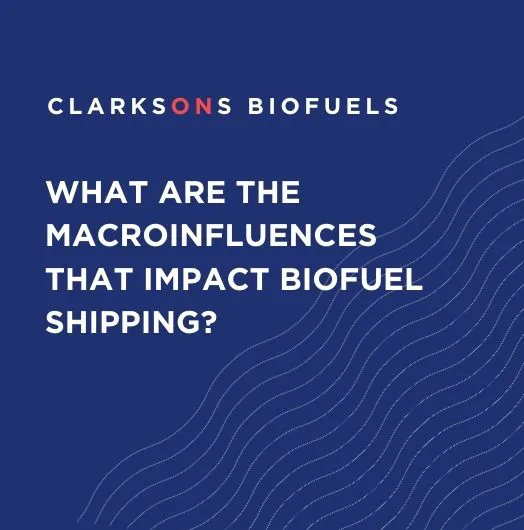The global biofuels market has experienced significant growth over the past two decades, driven by evolving regulations and the global shift toward clean fuels.
Partnering for success
Rapid market growth, shortage of tonnage and increases in regulation make for a challenging freight market. Considering the growing importance of biofuels in the vehicle, aviation and marine sectors, Clarksons can become an embedded part of your supply chain and logistics planning helping you to design a sustainable, proactive and competitive seaborne freight solution that ensures flexibility and utmost satisfaction for your customers. Our USP is our ability to advise, design and execute clients’ strategies. Whether it be spot or contract chartering, short or long term time charter cover, second hand vessel purchase, financing or newbuilding’s - Clarksons can work with you across all aspects.
Our services
Biofuel shipping challenges
The biofuels industry is evolving rapidly, shaped by regulatory changes and market demand. With increasing competition for chemical tanker space and shifting trade routes, securing efficient and cost-effective freight solutions has never been more important. Take a strategic approach to freight procurement.


Josh Saxby
Head of Business Development, Specialised Products and Director
Liew Chin Wen
Director
Will Banwell
Director
Tze Hui Chia
Senior Analyst
Kenneth Lim
Broker
Mark Shipton
BrokerKnowledge Hub
Understanding Biofuel shipping

Biofuels are fuels that are made from organic sources such as food crops, organic waste and algae (although not at commercial scale). These feedstocks are then blended with conventional fuels such as gasoline or diesel to reduce emissions from vehicles. Biofuels have become part of our daily lives with most of the petrol we put in our cars now having some level of bio content. In the last five years, biofuel use has rapidly expanded into other sectors including aviation and marine.

Biofuels – either the finished product or there crude/refined feedstocks – are mostly shipped on IMO classed chemical tankers. Some biofuels have more advanced seaborne carriage requirements than others and therefore the type of ship, its tank coatings and its last cargos are an important part of biofuel shipping. The chemical tanker market is a complex sector of the shipping markets with these vessels highly specialised in their construction to maintain flexibility and versatility for the range of different cargos they are required to carry. Biofuels is just one area of the market that these ships service.

Biofuels are mainly influenced by government regulations, with individual countries and supranational organisations (like the EU) setting emissions reduction targets and using biofuels as a key conduit to meet these goals. While regulation benefits the industry, it can also sometimes hinder the very product it aims to support. For instance, the EU has imposed anti-dumping duties on biofuel feedstock imports from China due to concerns about traceability, particularly since much of the feedstock comes from palm oil. As a result, European producers have been forced to find alternative sources to meet government-mandated blending requirements, as well as those set by the producers themselves. Although one shipping route closes, another may open, but in this case, the regulatory environment can sometimes have the opposite effect of what was initially intended.

Aside from the individual seaborne carriage requirements that some biofuels require, producers and traders need to be aware of a shipping supply outlook that is challenging. Whilst the chemical tanker orderbook has grown in the past 12 months it must be pointed out that these ships are not being built to carry biofuels alone. Rather biofuels will form a part of the cargo mix that these ships might carry throughout their trading life. The pace of biofuel and emissions regulation is somewhat faster than the shipping markets are, which means, for a variety of reasons, that competition levels for available shipping space with other sectors that utilise chemical tankers is likely to increase. As a result, producers and traders wishing to source competitive freight for their biofuel cargos might be faced with some hurdles. To mitigate freight rate exposure, meet company and government emissions targets and ensure timely delivery of biofuels to the end user, stakeholders need to think long term in their shipping strategies and leave no stone unturned!





